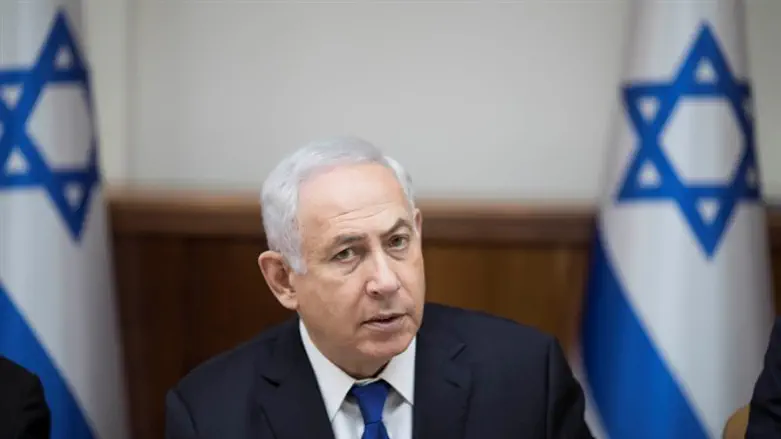
Prime Minister Binyamin Netanyahu said Friday that the threat posed by Iran to its Middle Eastern neighbors was driving them into hitherto unthinkable alliances with the Jewish state.
"Iran is devouring one nation after the other," Netanyahu said at Chatham House, the Royal Institute of International Affairs think-tank in London.
"It is doing so either by direct conquest or by using proxy. They took over Lebanon, Yemen... they try to do the same thing with Iraq, in Syria,” he added.
"The good news is that the other guys are getting together with Israel as never before. It is something that I would have never expected in my lifetime," said Netanyahu, who noted Israel was working "very hard" to establish an effective alliance with "the modern Sunni states" to condemn and counter Iranian aggression.
"I think that actually has a great promise of peace" for the region, he opined.
Netanyahu said the Middle East was witnessing "the emergence of a battle between the Islamists and the modernists", provoking a "new alliance between Israel and Islamic states."
His comments come as the United States seeks to promote links between Israel and the Arab world, with President Donald Trump's administration hoping to leverage regional interests to reach an Israeli-Palestinian Authority peace deal.
Netanyahu recently claimed that relations between Israel and the Arab world were better than ever before in Israel’s history. After those comments, Israeli public radio reported that a senior member of the Saudi royal family held high-level talks with Israeli officials during a clandestine trip to the Jewish state.
An Arab media outlet later identified the reported visitor as Saudi Crown Prince Mohammed bin Salman, the Defense Minister of Saudi Arabia and heir apparent to the throne. Saudi Arabia denied the report.
Netanyahu is in London for the celebrations of the 100th anniversary of the Balfour Declaration, which proclaimed Britain’s support for the establishment of a Jewish national home in then-Palestine.
While in Britain, Netanyahu also met Prime Minister Theresa May and Foreign Secretary Boris Johnson, to discuss a range of issues, including the Iran nuclear agreement.
In his remarks Friday, Netanyahu said the 2015 Iran nuclear deal reached with the international community does not go far enough to prevent Tehran from getting a nuclear weapon.
The agreement "basically says within X years of time, not much -- and times goes quickly -- you will have unlimited capacity to enrich uranium," he said.
The greatest danger is not that Tehran would violate the deal, "but that Iran would keep it", he warned.
Netanyahu, a longtime opponent of the Iran deal, has urged world powers to either "fix it or nix it."
"Nixing the deal means restoring massive pressure on Iran, including crippling sanctions, until Iran fully dismantles its nuclear weapons capability. Fixing the deal requires many things, among them inspecting military and any other sites which are suspect, and penalizing Iran for any violation. But above all, fixing the deal means getting rid of the sunset clause,” he said before the UN General Assembly in September.
Turning to relations with Washington, Netanyahu said Friday ties were stronger since the election of President Donald Trump.
He said he had "very strong" disagreements with Trump's predecessor Barack Obama, saying the former U.S. president saw Iran as part of the solution to problems in the Middle East, while he saw it as the main problem.
Netanyahu said he thought Trump saw Iran as the problem, adding, "And that a strategical and important shift that we appreciate.”
AFP contributed to this report.
(Arutz Sheva’s North American desk is keeping you updated until the start of Shabbat in New York. The time posted automatically on all Arutz Sheva articles, however, is Israeli time.)
